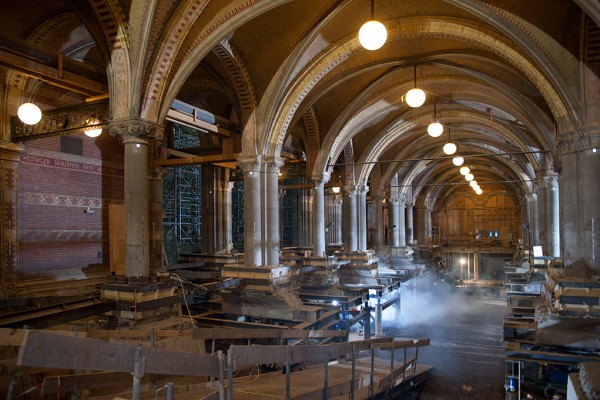
The renovation of the Rijksmuseum in Amsterdam turns into one crazy story in two-part documentary (photo courtesy Pieter van Huystee/Column Film)
THE NEW RIJKSMUSEUM (Oeke Hoogendijk, 2008/2013)
Film Forum
209 West Houston St.
December 18 – January 1
212-727-8110
www.filmforum.org
 In 2003, Amsterdam’s crown jewel, the Rijksmuseum, was closed to begin a major renovation. Little did everyone know at the time that the project would be delayed for years and go hundreds of millions of dollars over budget. Dutch director Oeke Hoogendijk captures all the surprisingly gripping fun and intrigue in the two-part, four-hour documentary The New Rijksmuseum. Hoogendijk brings her camera into every architectural meeting, monetary debate, and contractor dilemma, gaining remarkable access as no one shies away from sharing their personal and professional feelings on everything from the heated battle with community cycling activists over public use of the building’s entrance as a bike passage to such exacting details as paint color, smoothness of the walls, the art-historical value of certain works, and staying true to Pierre Cuypers’s 1885 building. The first documentary follows museum director Ronald de Leeuw as the process gets under way and continually gets mired in such issues as bidding contests that end up having only one participating company and the city’s dislike for a modern study center addition. In the second film, Wim Pijbes takes over as museum director in 2008, and his problems quickly mount as well as construction work eventually starts and deadlines approach. “I spend more time on cyclists than Rembrandt,” he acknowledges. “It’s my fate.” The interplay among such architects as Antonio Cruz, Antonio Ortiz, and Jean-Michel Wilmotte, a succession of project managers, curators of individual museum galleries, and the director is simply fascinating as they all give their very frank opinions on the renovation of the home of such treasures as Rembrandt’s “The Night Watch” and Vermeer’s “The Milkmaid.” There’s also a whole lot of hysterical eye rolling. Hoogendijk’s two films are part mystery, part thriller, part absurdist comedy, but at the heart of it all is a deep love of art and the understanding of its cultural importance. “You gain all this knowledge only to forget it all again, but the essence remains with you,” says Asian Pavilion curator Menno Fitski. “You don’t have to remember everything you see in a museum. The experience is what makes you feel like a better human being.” The New Rijksmuseum will change the way you experience museums, especially the next time you walk through MoMA, the Met, the Louvre, or any other major cultural institution, and perhaps most of all, it will make you want to go to Amsterdam and see the new Rijksmuseum itself. The two parts are being shown at Film Forum through January 1; although you can see them separately for the price of one admission, it’s a lot more exciting watching them back to back, immersing yourself in this crazy, complicated love story.
In 2003, Amsterdam’s crown jewel, the Rijksmuseum, was closed to begin a major renovation. Little did everyone know at the time that the project would be delayed for years and go hundreds of millions of dollars over budget. Dutch director Oeke Hoogendijk captures all the surprisingly gripping fun and intrigue in the two-part, four-hour documentary The New Rijksmuseum. Hoogendijk brings her camera into every architectural meeting, monetary debate, and contractor dilemma, gaining remarkable access as no one shies away from sharing their personal and professional feelings on everything from the heated battle with community cycling activists over public use of the building’s entrance as a bike passage to such exacting details as paint color, smoothness of the walls, the art-historical value of certain works, and staying true to Pierre Cuypers’s 1885 building. The first documentary follows museum director Ronald de Leeuw as the process gets under way and continually gets mired in such issues as bidding contests that end up having only one participating company and the city’s dislike for a modern study center addition. In the second film, Wim Pijbes takes over as museum director in 2008, and his problems quickly mount as well as construction work eventually starts and deadlines approach. “I spend more time on cyclists than Rembrandt,” he acknowledges. “It’s my fate.” The interplay among such architects as Antonio Cruz, Antonio Ortiz, and Jean-Michel Wilmotte, a succession of project managers, curators of individual museum galleries, and the director is simply fascinating as they all give their very frank opinions on the renovation of the home of such treasures as Rembrandt’s “The Night Watch” and Vermeer’s “The Milkmaid.” There’s also a whole lot of hysterical eye rolling. Hoogendijk’s two films are part mystery, part thriller, part absurdist comedy, but at the heart of it all is a deep love of art and the understanding of its cultural importance. “You gain all this knowledge only to forget it all again, but the essence remains with you,” says Asian Pavilion curator Menno Fitski. “You don’t have to remember everything you see in a museum. The experience is what makes you feel like a better human being.” The New Rijksmuseum will change the way you experience museums, especially the next time you walk through MoMA, the Met, the Louvre, or any other major cultural institution, and perhaps most of all, it will make you want to go to Amsterdam and see the new Rijksmuseum itself. The two parts are being shown at Film Forum through January 1; although you can see them separately for the price of one admission, it’s a lot more exciting watching them back to back, immersing yourself in this crazy, complicated love story.